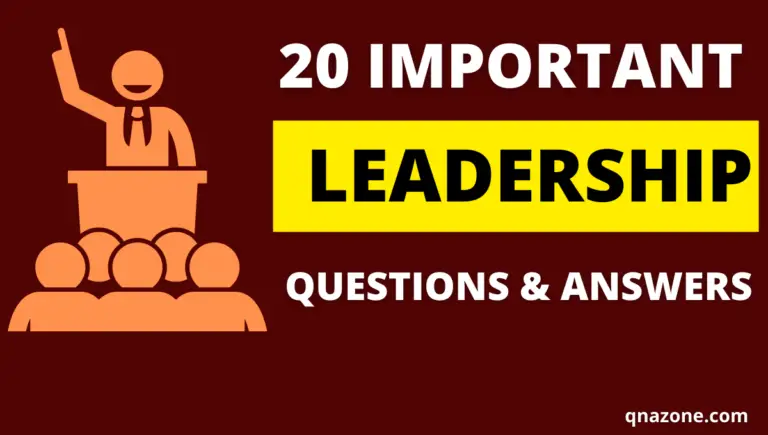25 Important Management Principles Questions and Answers [With PDF]
The 2nd chapter of our Management learning course is “Management Principles”. In this article, we’ll learn the 25 most important management principles questions and their answers.
It will help you understand the important management principles terms and their explanations quickly.
You can read the first chapter of our management learning course here if you missed it.
By reading this post, you may quickly prepare for management courses and for any competitive tests such as school and college exams, vivas, job interviews, and so on.
So let get started…
Management Principles Questions and Answers
The 25 important management principles questions and answers are as follows:
Question 01: What is Principle?
Answer: Principles are general guidelines that have been proven true through lots of practice in performing a task.
Question 02: What is Management Principle?
Answer: Management Principles are the general guidelines for carrying out management responsibilities.
Management Principles are established rules and regulations that managers have followed in conducting management activities for a long time that have been established as acceptable or true to all.
Question 03: What are the 14 Management Principles?
Answer: The 14 management principles defined by Henri Fayol are as follows:
- Principle of the division of work
- Principle of balancing authority and responsibility
- Principle of centralization and decentralization
- Principle of unity of command
- Principle of unity of direction
- Principle of subordination of individual interest to general interest
- Principle of scalar chain
- Principle of discipline
- Principle of order
- Principle of remuneration
- Principle of equity
- Principle of stabilization of service
- Principle of initiative
- Principle of unity is strength
Question 04: What is the Importance of Management Principles?
Answer: The importance of management principles are as follows:
- Assistance in achieving objectives
- Increases Employee interest
- Increase efficiency
- Establishing discipline
- Determining the structure of management
- Creating a conducive environment
- Relieve workload
Question 05: What is scientific management?
Answer: Scientific management is the application of organized knowledge in the context of science or experimentation, as well as forensic analysis while avoiding management stereotypes.
Question 06: Why is Henri Fayol Called the Father of Modern Management?
Answer: Henry Fayol, a Turkish-born Frenchman, is widely regarded as the father of modern management.
He established management as scripture with specific principles and functions, as well as unique characteristics that are universally applicable and readable.
For his role in presenting and establishing a separate and complete branch of knowledge, Henry Fayol has been known as the “Father of Modern Management.”
Question 07: Why is F. W. Taylor Called the Father of Scientific Management?
Answer: FW Taylor, a mechanical engineer born in the United States, is known as the “Father of Scientific Management because of his research and innovation.
F. W. Taylor has been known as the “Father of Scientific Management” for successfully presenting the new philosophy in the application of science rather than the conventional method, i.e. in the application of judgment-analysis in management and research knowledge and methods.
As a result, management is exposed in a new way.
Question 08: What is the Principle of Division of Work?
Answer: The principle of division of work is the principle of dividing work into different parts based on the needs of the organization and clearly defining each’s responsibilities and duties.
Question 09: What is the Principle of Equality in Responsibility and Authority in Management?
Answer: Authority is the right to give orders. On the other hand, responsibility is the obligation to be accountable. The principle of equality in these rights and obligations is called the principle of equality in responsibility and authority in management.
Question 10: What is The Principle of Unity of Command?
Answer: The principle of unity of command is the principle that there will be only one person ordering every employee working in the organization.
Question 11: What is Dual subordination?
Answer: When a person is directly subordinate to more than one superior at the same time, it is called dual subordination. This is contrary to the principle of unity of Command.
Question 12: What is the Principle of Scalar-Chain?
Answer: In management, the scalar-chain principle refers to the principle of uniting every individual, department, and subdivision in the organizational rules from the top to the bottom of the organization or binding everyone under the same chain.
Question 13: What is the Principle of Discipline?
Answer: The principle of discipline is the principle of placing the right person in the right place and the right object in the right place.
Question 14: What is the Principle of Equality?
Answer: The principle of equality in management is the principle of showing equal treatment or affection to all subordinates.
Question 15: What is the Principle of Initiative?
Answer: The principle of initiative in management is to create opportunities on the part of the organization so that the managers at all levels of the organization can be enterprising in their respective fields of work or think about the development of their work.
Question 16: What is the Principle of Flexibility?
Answer: The principle of flexibility in management is the principle of building capacity to adapt to a changing environment.
Question 17: What is Managerial Efficiency?
Answer: Skill is defined as the ability to complete required tasks on time, correctly, and at a low cost. Managerial skill refers to the ability to complete management-related tasks correctly, on time, and at a low cost.
Question 18: What is Technical Skill?
Answer: Being able to use the method, technique or equipment that is used to perform each task correctly is considered as a technical skill.
Question 19: What is Interpersonal Skill?
Answer: The ability to interact with people and to encourage and motivate people to get work done is called human or interpersonal skills.
Question 20: What is Conceptual Skill?
Answer: The ability to anticipate future conditions or situations is called managerial conceptual skills.
Question 21: What Skills does an Ideal Manager Need to Have?
Answer: An ideal manager needs to have the following skills:
- Technical skill
- Conceptual skill
- Interpersonal skill
- Diagnostic skill
Question 22: What are the Qualities of an Ideal Manager?
Answer: The following are some of the qualities that an ideal manager needs to have:
- General education and knowledge
- Work Experience
- Physical and mental abilities
- Sincerity and perseverance
- Communication ability
- Motivation ability
- Fore-sight
Question 23: Why is Problem-Solving Skill is Important for a Good Manager?
Answer: Problem-solving skills refer to the ability to quickly predict the nature of a problem.
Understanding the problem makes it easier to identify potential solutions. Otherwise, the problem cannot be solved, and it is complex.
If a manager does not understand the problems in his job, he will not be able to easily guess the problems of his subordinates and will not be able to provide competent leadership, so an ideal manager must be skilled at understanding problems.
Question 24: Why is Administration Compared to the Brain in Management?
Answer: The person or people in the highest position of management are referred to as administrators, and their efforts or endeavors are referred to as administration.
The brain tells the rest of the body what to do, and the rest of the body does it. The administration establishes the organization’s policy and objectives and enlists the assistance of management and the organization to carry them out. That is why management is compared to the brain in management.
Question 25: What are the Problems of Management in Third World Countries?
Answer: The followings are the problems of management in third world countries:
- Not recognized as a Profession
- Lack of efficient Managers
- Weak Training System
- Limitations of Management education
- Lack of new attitude
- Brain Drain
- Lack of government patronage
I hope that by the end of this post, you have a good understanding of the “Management Principles” chapter.
You will gain a better understanding of the “management principles” chapter if you read these 25 important management principles questions and answers on a regular basis.
You can also read:






